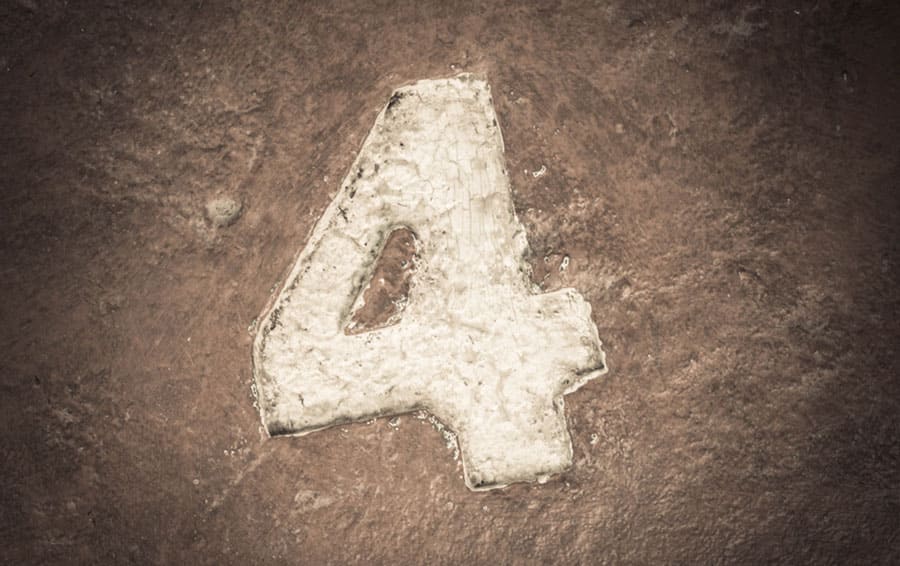
We all have our lucky numbers, those digits that inspire confidence and hope. But what about their unlucky counterparts? Across the globe, certain numbers carry the weight of misfortune, and among them, the number four holds a prominent position. In some cultures, the mere mention of four sends shivers down spines, igniting anxieties and superstitions. But why is this seemingly ordinary number perceived as unlucky? Let's look into the fascinating world of tetraphobia, the fear of the number 4, and explore the historical, cultural, and linguistic roots behind its perceived misfortune.
While some cultures view four as unlucky, others embrace it with open arms. Here's a glimpse into both sides:
China: The pronunciation of four in Cantonese ("sei") sounds similar to the word for "death" ("si"). This homophony fuels widespread avoidance of the number in buildings, addresses, and phone numbers.
Japan: Similar to China, the pronunciation of four ("shi") is associated with death ("shi"). Buildings often skip the fourth floor, and hospitals might avoid room number four.
Vietnam: The number four is associated with misfortune and bad luck, influencing everything from naming ceremonies to wedding dates.
Germany: The lucky four-leaf clover, a symbol of good fortune, thrives in German culture. The number four itself doesn't carry negative atmoshphere.
Italy: Quadrifoglio, the four-leaf clover, represents good luck and is widely celebrated. The number four isn't generally considered unlucky.
Pythagoreanism: Ancient Greek philosophy associated four with stability, perfection, and the four elements (earth, air, fire, water).
These contrasting perspectives highlight how cultural context and historical interpretations shape our perception of numbers.
Beyond Words: Historical and Linguistic Influences
The negative association with four isn't just a coincidence. Here are some contributing factors:

Numerology: In ancient Chinese numerology, four often linked to misfortune and death, further solidifying its negative connotations.
Cultural Taboos: The association of four with death or misfortune, like in Japan, might have stemmed from historical events or cultural taboos associated with the number.
Linguistic Similarities: In languages like Cantonese and Japanese, the homophony with words related to death creates an automatic negative association.
However, it's important to remember that these interpretations are not universal, and cultural understanding is crucial when encountering different beliefs.
Tetraphobia in the Modern World: Persistence and Evolution
Although some cultures are moving away from these superstitions, tetraphobia persists in certain regions. Here's how it manifests:
Architectural Quirks: Buildings might skip the fourth floor or omit the number from room numbering systems.
Date Avoidance: Some individuals might avoid scheduling important events or weddings on dates containing the number four.
Personal Anxieties: People with tetraphobia might experience genuine anxiety or discomfort around the number.
Respecting and understanding these beliefs is essential to navigating diverse cultural landscapes.
Read About: Lucky Pennies or Coins - Superstition
Embracing Cultural Diversity: Moving Beyond Superficial Stigmas
It's crucial to remember that beliefs surrounding four are cultural interpretations, not scientific facts. While acknowledging existing anxieties is important, fostering cultural understanding and respecting diverse perspectives is paramount.
Ultimately, numbers are just numbers, and their perceived luckiness or unluckiness rests in the hands of cultural explanation. So, the next time you encounter the number four, remember – its meaning is shaped by shared stories, historical echoes, and the rich world of human experience. Instead of fearing it, appreciate its diverse explanation and the fascinating cultural insights it offers.
Conclusion: 4 Superstition
In conclusion, tetraphobia, the fear of the number four, is influenced by cultural, linguistic, and historical factors. While some cultures associate four with misfortune due to linguistic ties to death, others celebrate it as a symbol of stability or good luck. Respecting cultural diversity and understanding the varied interpretations of numbers is crucial. Instead of fearing the number four, let's appreciate its diverse meanings and the insights it offers into different cultures globally.
FAQs: Demystifying the Number Four
Is the number four unlucky everywhere?
No, the perception of four as unlucky is specific to certain cultures and regions. Many cultures hold positive associations with it.
What can I do if someone feels anxious about the number four?
Be respectful and understanding of their beliefs. Avoid using the number in ways that might cause discomfort and offer reassurance if needed.
Does science support the idea that the number four is unlucky?
There's no scientific evidence to suggest that the number four has any inherent power to bring good or bad luck.
How can I learn more about cultural beliefs surrounding numbers?
Researching cultural practices and engaging in respectful conversations with individuals from diverse backgrounds can offer valuable insights.
Is it okay to joke about someone's fear of the number four?
Avoid making jokes or lighthearted comments about someone's beliefs, as it might be disrespectful and insensitive. Remember, these anxieties are real for some individuals, and treating them with understanding and compassion is crucial.
For more Interesting topics follow us on Instagram
Author :